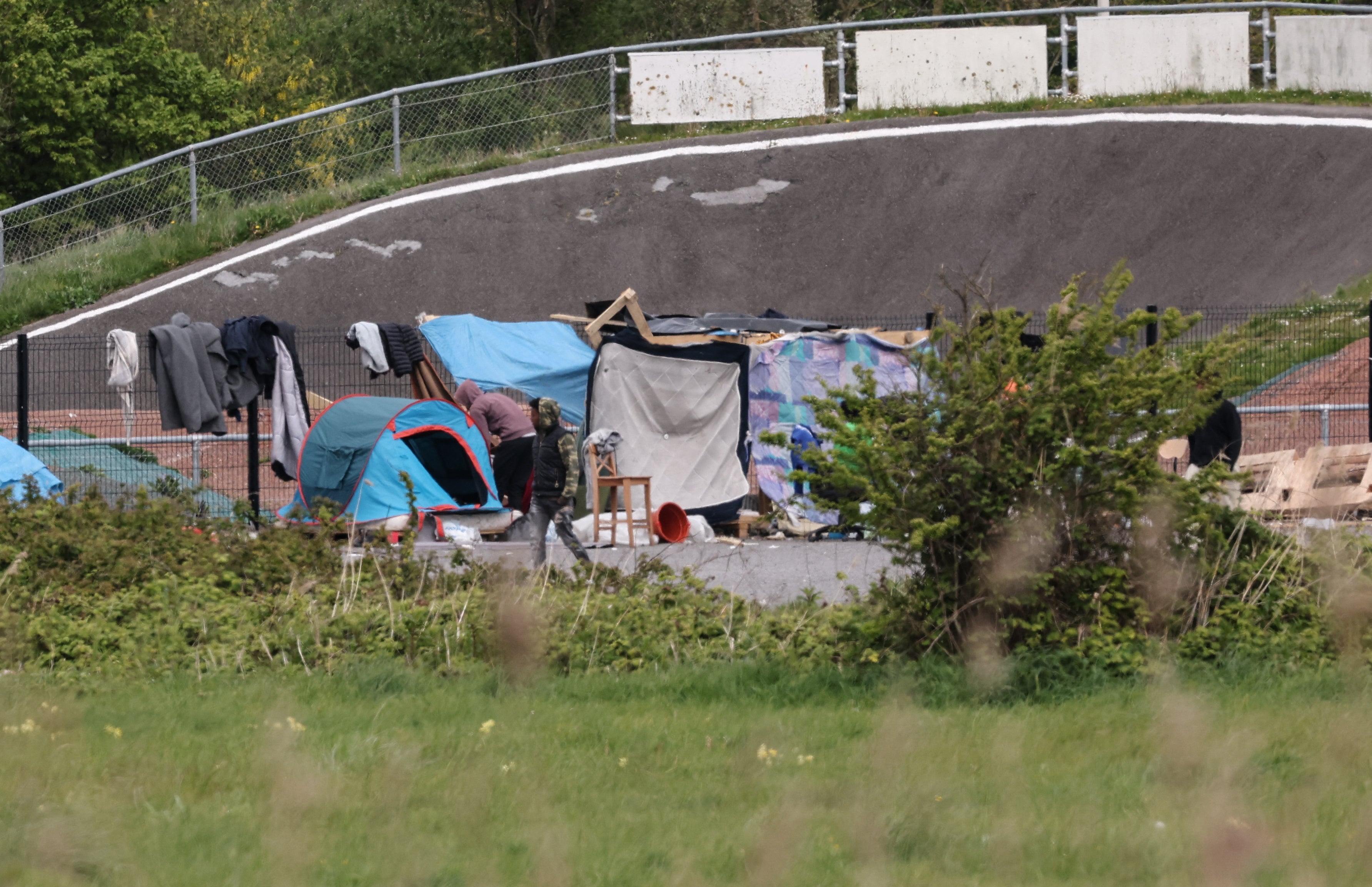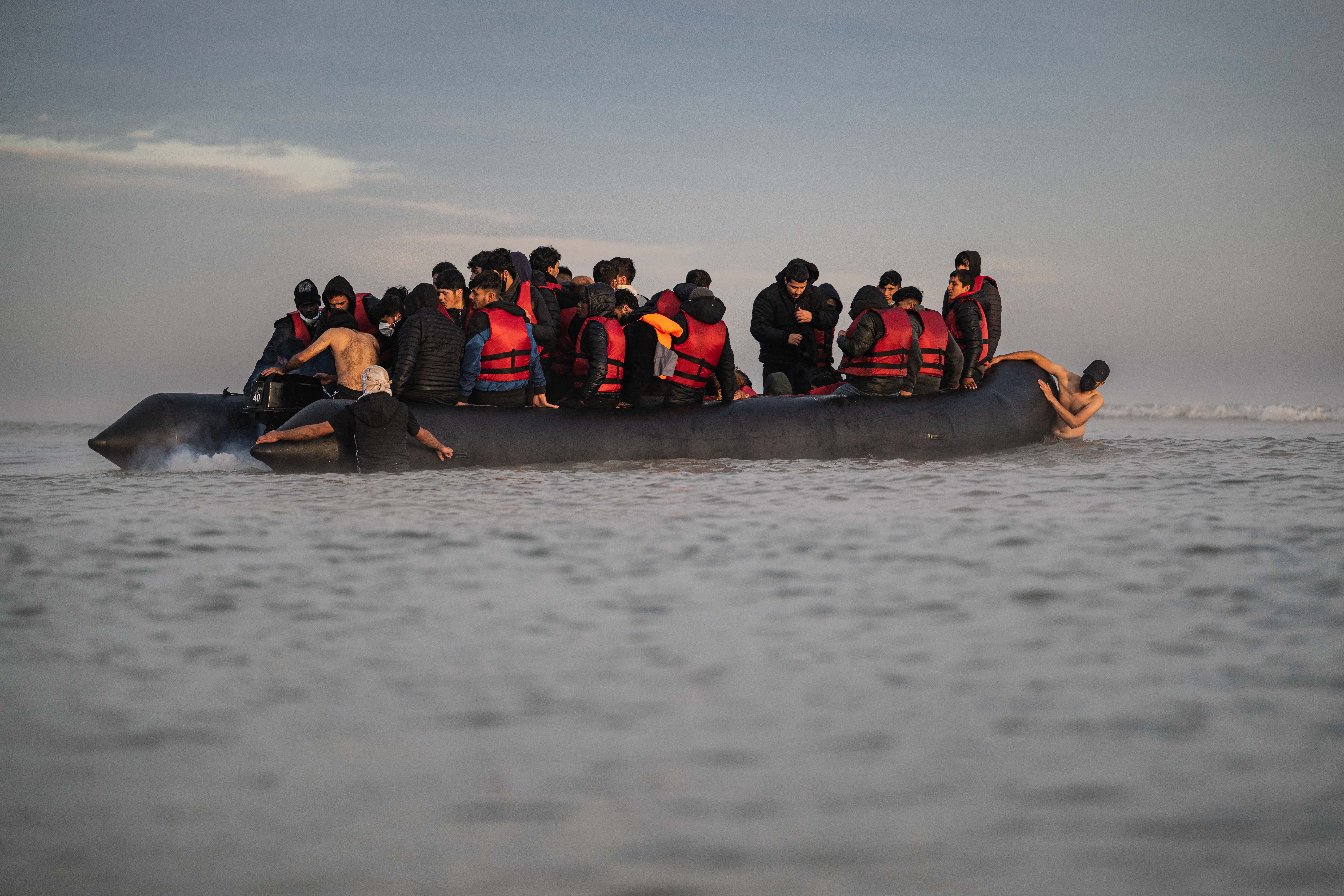‘Endless torture’: French police force migrants into Channel crossings as numbers hit new daily record
Exclusive: Asylum seekers in northern France say crackdowns push them to risk the dangerous crossing, with more than 700 arriving in a single day
Your support helps us to tell the story
This election is still a dead heat, according to most polls. In a fight with such wafer-thin margins, we need reporters on the ground talking to the people Trump and Harris are courting. Your support allows us to keep sending journalists to the story.
The Independent is trusted by 27 million Americans from across the entire political spectrum every month. Unlike many other quality news outlets, we choose not to lock you out of our reporting and analysis with paywalls. But quality journalism must still be paid for.
Help us keep bring these critical stories to light. Your support makes all the difference.
Migrants say they are being driven to attempt channel crossings by increased aggression from French police – funded by Britain – who force them to move on from their camps every 48 hours.
Refugees living in makeshift camps in Dunkirk said police were dispersing them every two days, and that every 10-12 weeks police in riot gear destroy their whole camp.
A record 711 people crossed the Channel in small boats on Wednesday – the busiest day of the year so far, in a blow to Rishi Sunak’s plan to dissuade migrants from making the dangerous journey to Britain.
One Afghan refugee told The Independent how the constant destruction by police of camps was making him and others increasingly desperate to reach the UK. He said: “I have to go to the UK because France is not accepting us. The worst is that every few weeks the police are coming and destroying our tents and blankets everything, and then we just have nothing in the rain.
“I just want to work and have a safe life. We want a peaceful life, we hope we can have that in the UK because we do not have it here. Why this endless torture of ripping apart our tents every few weeks?”
Charity workers explained that they had seen an increase in police aggression in the past six months, which they said was forcing migrants to make more risky attempts at Channel crossings.
Mr Sunak announced in March 2023 that Britain would give France £500m over three years to fund French border guards, as well as video surveillance cameras, drones and night-vision binoculars. This kit is being used by police officers on the beaches when they try to force migrants away from small boats at night. Migrants reported police slashing boats to stop them launching, or flying helicopters and drones low to the ground to scare them away.
France agreed to the regular use of drones to monitor crossing attempts for the first time in January after home secretary James Cleverly met with French interior minister Gerald Darmanin. Mr Cleverly praised French law enforcement efforts on the border, saying the “results are impressive”, and Mr Darmanin said the two countries would “deepen their cooperation”.
Despite an increased police presence on the beaches, small boat arrivals to the UK are up compared to the same time a year ago. There were 6,265 small boat arrivals between 1 January and 21 April this year, compared to 5,049 in the same period in 2023 – an increase of 24 per cent.

Mr Sunak said on Thursday that the number of people coming across the Channel was “unacceptable”, but insisted that the start of flights to Rwanda would “provide the effective deterrent”.
He acknowledged the high numbers coming to Britain in recent weeks, but said crossings in the past year are still lower than a spike in 2022.
Another Afghan refugee, Shafiullah, 30, said the police pressure in the camps was driving his desire to get to the UK as soon as possible. “I have been in the jungle three months and 15 times I have tried to get a boat to the UK,” he said. He said tear gas was being used against migrants on the beaches when they tried to cross the Channel, and that police would race refugees to boats to puncture them so they cannot launch.
Migrants told The Independent they were having to walk for four to eight hours during the night to get to beaches where they were attempting to get on dinghies for the UK.
Last month, five died, including a seven-year-old girl, after setting off from Wimereux beach, which is a 16-hour walk from Dunkirk. Another recent death of a seven-year-old girl in March occurred in Watten, 20 miles away from Calais.
Chris McSherry, 29, operations coordinator at charity Care4Calais, said: “Because of the increased policing of this, it’s affecting where people are going from. People still do cross from Sangatte, cross from Calais, but we are also seeing people go further. We’ve heard of people crossing from Belgium. When the young girl passed away in March, that was in Watten, which is 25 kilometres inland. So people are having to find other methods, other ways of where to go from. A lot of that is down to the policing operation.
“People are pushed to take much longer journeys that are more dangerous. When people are unsuccessful in their journeys, we’re seeing much more dangerous situations from that. People are coming back with burns from the fuel, people who are coming back with severe hypothermia or severe sun exposure because they’ve been out for hours.”
Data from the Missing Migrants Project show 14 people have already died in the Channel this year, compared to 21 people for the whole of 2023.

A joint investigation by The Observer, Lighthouse Reports, Le Monde and Der Spiegel recently found French police had started forcing small boats to turn around in the water and using tactics such as puncturing them.
Local authorities have also limited the work of aid organisations in the area, closing down the main site from which they would distribute food in Dunkirk only two weeks ago and surrounding the area with a metal fence.
A Home Office spokesperson said: “The unacceptable number of people who continue to cross the Channel demonstrates exactly why we must get flights to Rwanda off the ground as soon as possible.
“We continue to work closely with French police who are facing increasing violence and disruption on their beaches as they work tirelessly to prevent these dangerous, illegal and unnecessary journeys.
“We remain committed to building on the successes that saw arrivals drop by more than a third last year, including tougher legislation and agreements with international partners, in order to save lives and stop the boats.”
The prefectures for northern France and Pas de Calais have been contacted for comment.
Subscribe to Independent Premium to bookmark this article
Want to bookmark your favourite articles and stories to read or reference later? Start your Independent Premium subscription today.

Join our commenting forum
Join thought-provoking conversations, follow other Independent readers and see their replies
Comments